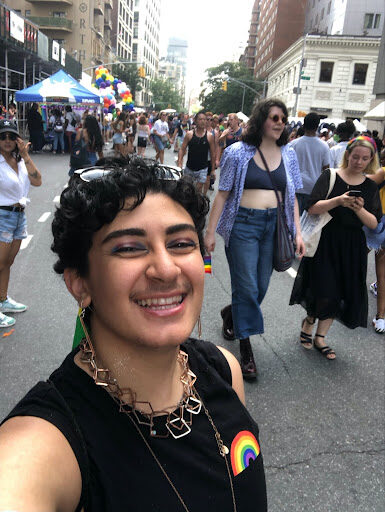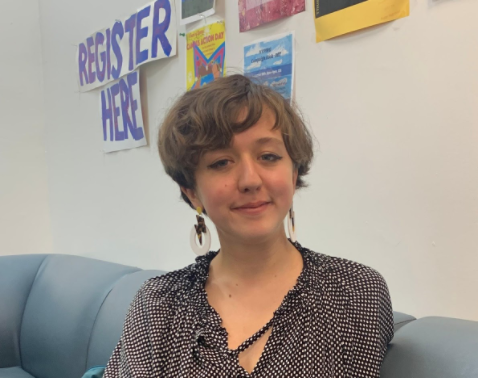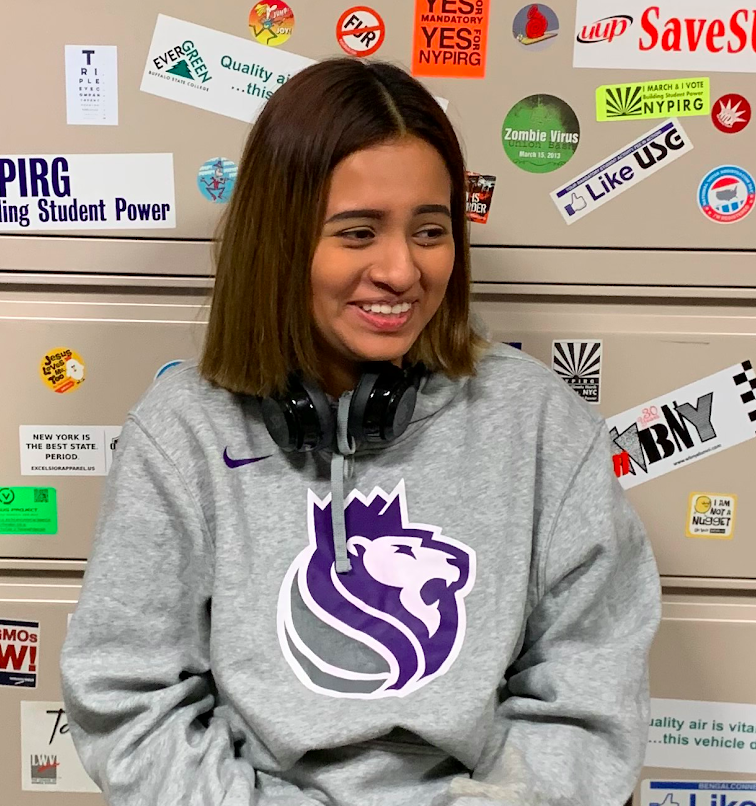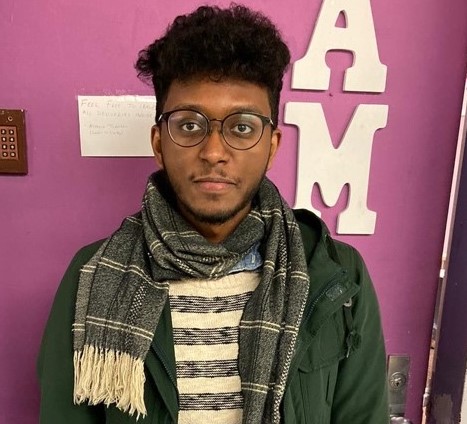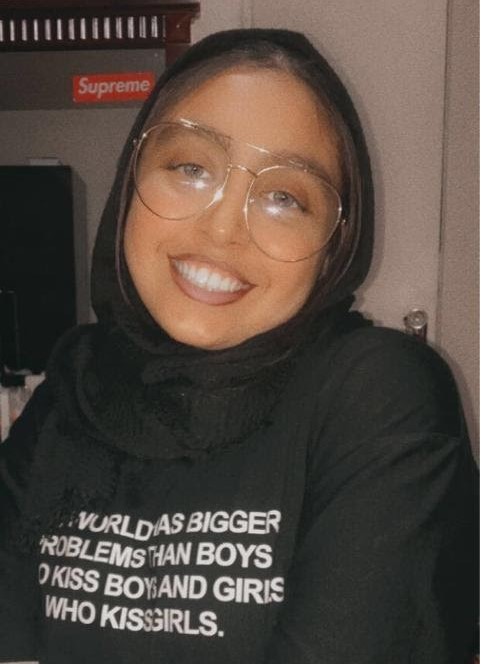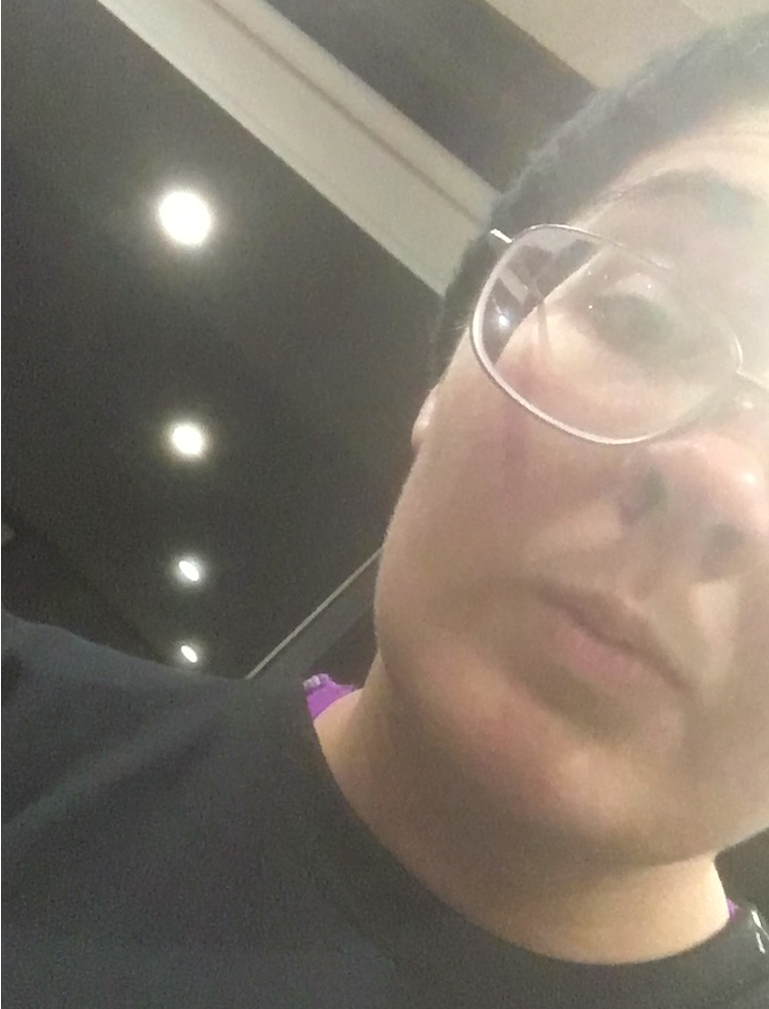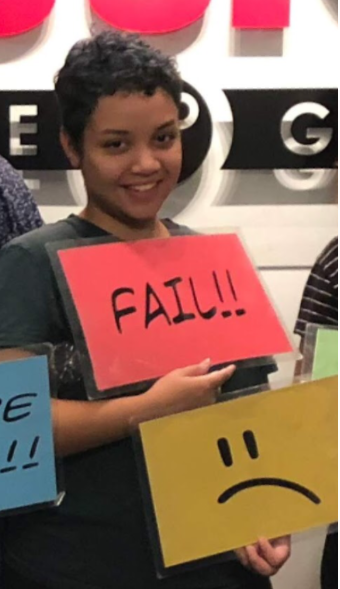Posts Tagged ‘Work-Study’


Anahi Urias is a sophomore photography major at Pratt Institute. As a first-generation college student, she struggles daily to navigate college with little guidance on the process. These struggles are especially prevalent when figuring out how to pay for school.
“My father works in sanitation in Santa Monica. Every day he leaves for work at 7 am and doesn’t return home until 8 pm. He does that every day for 7 days a week, and it’s still not enough.” Anahi said when asked about her biggest inspiration for attending Pratt Institute. She goes on to explain that even though in the “eyes of the government” her father is well off, her family struggles to make the necessary expenses needed to live comfortably. Resulting in her beginning her first job at 15.
“I would go to school – which would end at 4 – I’d have worked at 5 or 5:30. Within that time frame, I would make the commute to work. Then I would work till 9 or 10. That’s a lot to put on a 16-year-old. I was literally a kid, you know.” Dealing with customers and working in such a strenuous environment from a very young age revealed to Anahi that she had to pursue higher education. It was the only way to ensure that she would be able to provide her family with a life that would be worth living. “When I decided to go to Pratt, I started to pick up extra hours to save money on top of supporting myself. I would wake up, go to work, wash dishes for 8-10 hours, and then go home, and repeat that for 6 days a week. And on days when I had off, I had to choose between resting my body or doing something (creatively) productive.” Anahi makes the point that while attending Pratt she is going through the same environment that she started at 16. Except now she is doing it for something she loves. Though she is happy and grateful for this opportunity, the mental energy exerted between beginning a career and working just to make the next tuition payment is impossible to maintain. “I have to do it (working and going to school), but it’s hard when not only am I trying to stay happy – I’m also trying to figure out how I’m going to afford to eat the next day. It’s a lot,” she continues. “And it’s a lot when you don’t have your parents sending you 500 dollars every week. Or every other 2 weeks. Or just 500 dollars in general.”
Anahi struggles through tuition, food insecurity, and maintaining her mental health every semester. In combination with the limited support from her parents, it is impossible to truly feel secure in her identity as a student. “Even with the financial aid awards I’ve received, there’s still a good amount of money I have to pay. And I have to pay for the materials on my own and that itself is a lot of money. I still have a balance to pay, and I can’t register for classes until I’ve paid my balance. And it’s not like I can just write a check – that check will bounce – and I can’t get a loan, and my parents can’t get a loan.”
“I worry about that (paying off loans) all the time. You know because college isn’t a guaranteed thing. Even if you get a high-paying job – you still have to figure out rent and water bills, and then you have the student loans that you have to start paying for six months after college. And to even get the job in the first place? It’s difficult because there’s a lot of people fresh out of college and they’re doing the same thing you’re doing.” This struggle has begun to seep into pre-graduate life. Anahi currently works a work-study job on campus. She is grateful to work on campus. It frees up time in her schedule and eliminates the commute. However, she is only given one shift because her peers also need to be scheduled. “There are so many students that need a Work-Study that there aren’t enough hours for everyone.”
Despite it all, Anahi’s passion for her art remains. “Photography is what I love doing. The actual action, being in your own zone, holding a camera, just choosing where and how you want to make an image appear that in and of itself is relieving to me. I find a lot of joy in it. Being able to do something you love doing, and getting paid for it? Sign me up.”


Atlas Thomas is a senior, sculpture integrated practices major at Pratt Institute. Going to college in the midst of a global pandemic forced Atlas to rethink the way he approached his educational finances. Though with the help of financial aid Atlas was able to get this far in his educational journey.
“I got really into ceramics when I was in high school. I was doing okay with it then we got to wheel throwing, and I sucked. I just couldn’t do it. Everything I made would be terrible. I said to myself this is inexcusable, I can’t be bad at this. I continued to work at it, and I got a job at a pottery studio. As the years went on I just fell in love with pottery and fell in love with sculpting. It wasn’t like one moment, it was like a slow build up. I have a Parent Plus loan. I think I have the Pell Grant, the Presidential Scholarship, and I work – I work two on campus jobs – one in the Fine Arts wood shop, and another in the ceramics studio. We (my parents and I) have been getting loans since my freshman year. If we hadn’t been getting loans it would have been a lot more difficult, mainly because it’s just so expensive to live here.
For the last two years I’ve lived off campus, and paying rent is difficult, because it’s just so expensive to live here. I live in an apartment a couple blocks from campus, and I have roommates. A good majority of my expenses are covered through financial aid. I budgeted a little bit less than I needed on purpose, because I didn’t wanna have too many loans to pay after I graduated. I made it to where loans will pay for so much and I would need to work to cover the rest. I had a plan, because I didn’t wanna be in debt for the rest of my life. I probably am – but like less debt now, by a couple thousand. I’m a little bit worried about how I’m going to pay back my loans, only because I don’t have a guaranteed job after graduation. I’m looking for paid internships, and a job, because after graduation I won’t have these on-campus jobs, which covers my expenses. I am lucky enough that my parents are helping me out a little bit. Last year I was trying to do it all on my own; it wasn’t sustainable, so my parents agreed to help me out. I work 18 hours a week on top of six classes, because I’m a full time student. So I’m a full time student with 2 full time jobs and that cover most of my expenses.
It’s difficult to pay for it all (tuition, rent, etc) – the apartment I live in wasn’t my first choice, so I ended up paying a couple hundred dollars more than I had budgeted for. It’s still less than I was paying last year. I only took out the bare minimum, I’m just trying to be frugal with it. My junior year I got loans to cover a little bit of my living expenses. Covid messed up whatever numbers I had. It ended up not being what the school was going to charge me. The school tends to charge people more than they say they will, so I had to deal with that. I was working 2 jobs on campus last year about 19 – 20 hours a week. So that covered most of it. I had to dip into my savings, but for the most part all of last year everything was on me. My parents helped me with groceries, but I have three siblings that my parents also support, and I didn’t want to be a burden. It’s exhausting to go through school and deal with those feelings. My mom always talks about how she paid her way through college and med school, so there’s this mentality that you have to work – you have to put in the hours – you just gotta work. I’ve been working since I was like 6 years old basically. I’ve been expected to work for a good majority of my life, so working my way through college was just like a given.”


I love Pratt, but sometimes I feel frustrated that the institution doesn’t do a better job accommodating the financial needs of students. I’m commuting from Astoria, Queens to my classes because of the cost of housing here at Pratt. It was also really tough getting a work-study position. A lot of my friends weren’t able to either, and I think there should be more jobs available on campus. It’s difficult enough having to work while being a student, and I think Pratt could do a better job acknowledging that and supporting initiatives that help them. If there were a better work-study program, I would more easily be able to support myself through school.


I am a freshman at Hunter College currently studying Biology. After college, I plan on going to medical school to further my education. I do not pay for school on my own, I receive financial aid. I receive TAP, Pell, and am a part of the SEEK opportunity program. I pay for my textbooks with the money I receive from Seek. I do not work but am trying to find a job to help support my family with money. I do not receive SNAP or work-study and pay for food with my SEEK checks and other financial aid. If I did not receive financial aid, I would have to resort to taking out a loan or finding a job so that I can make my own money. I am somewhat concerned about graduating on time, because I might not be able to complete all of my prerequisites for my major in time.
We need a fully-funded CUNY for low-income students who are not in any opportunity programs like SEEK or EOP and have to depend on other means such as working or work-study to pay for college. Many students could benefit from increased investment. Too many students have to rely on balancing jobs, school, and loans.


I am a freshman at Buffalo State. I am a political science major from Queens, NY. I came to Buffalo State planning on majoring in political science because I’ve always been interested in politics and watch the news a lot, though it was comedy shows like the Daily Show that first got me into politics. I want to go to law school so I can practice public interest law, serving clients who can’t afford a lawyer. This means, of all my siblings, I will be the odd one out—the only non-accountant!
I went to the High School of Environmental Studies in Manhattan, where the emphasis was on environmental science. That got me interested in environmental studies. I decided on Buffalo State because I definitely didn’t want to stay in the city for college and wanted a change of scenery so I could focus on studying.
As a freshman, textbooks have been a concern because, even though rentals are sometimes an inexpensive options, it’s first come first served. The bookstore is almost always out of rentals when I go to buy them, which means I have to pay full price. Luckily this term, I managed to get a few rentals for $130, but many classes have multiple books that are hardly ever used. You can’t really tell what books you’re actually going to need, and it becomes an expensive guessing game.
I am not working at the moment because, even though I qualify for federal work-study, there aren’t nearly enough on-campus jobs for all the students who qualify. That means I have to look for off-campus jobs. Given Buffalo weather and not having a car, my choices are limited. It’s important to have a job because of how expensive college life is.
With TAP and all the scholarships I received, I still pay about $5000 toward tuition per semester. My family is paying these costs out of pocket, and I currently can’t register because I haven’t paid for the previous term. I can’t even look at my GPA if I wanted to transfer because everything is frozen until I pay. Courses for my major could get filled before I have time to pay up and register. Financial aid advising needs to be clearer so students know where they stand.


I’m double majoring in anthropology and Political Science. After graduating, I plan on getting a master’s in International Relations and hopefully working for a nonprofit organization.
I receive the Pell Grant, but it doesn’t cover my full tuition so I have to work and pay the rest out of pocket. I also pay for books, transportation, and food. Working while being a full-time student is stressful because it’s hard to balance school and work.
My biggest challenge as a CUNY student has been getting to class on time because living in New Jersey and commuting to New York is really hard. I would appreciate work-study and have made an appeal on my application but haven’t heard back.
I would appreciate a child care center on campus because I know a lot of students who have children and have nowhere to leave them while they’re in school.
CUNY should be free and fully funded because a lot of students struggle financially, and education should be a right for everyone to access. It shouldn’t be limited by your financial situations.


I’m a junior majoring in international studies, and I’m minoring in English and Economics. After graduation, I would love to work with a nonprofit organization and hopefully one day I will be able to work with the UN!
I
receive TAP and the Pell grant. I’m part of SEEK, which has helped me
tremendously because they have provided me with a very helpful advisor,
financial help, and an amazing environment for me to be in. I use the money
that I get as a refund after my tuition to pay transportation, food, and books.
I’m currently looking for a part-time job and an internship with a nonprofit organization, but because of my busy schedule at school, it’s very difficult. I’ve also applied for federal work-study, but because financial aid covers my tuition, my application isn’t a priority.
I would
appreciate a child care center on campus because I have many classmates that
bring their children into the classes, and although they don’t often disrupt
the class, they are a distraction to their moms because they have to pay
attention to the children instead of paying attention to the class.
Time management has been my biggest challenge at a CUNY student. I’m very concerned about graduating on time because I have changed majors. It has become very stressful because I am taking six classes next semester. If I didn’t receive financial aid, my parents would have to take out loans to help pay for tuition which would be really hard because I would have to work in order to support myself as well.
We need a fully funded CUNY because many plan on pursuing a master’s or a doctorate degree after college, and if students no longer had to worry about paying for their bachelor’s degree, they could save for furthering their educations. Also, it becomes very hard for a student to maintain a high GPA if they have to work to pay for their tuition, books, and food.


I’m a sophomore at SUNY Cortland double majoring in anthropology
and international studies. I’m also getting a minor in Latin American studies.
At this point, I’m considering going to law school after graduation or going
into humanitarian work.
I’m from California, so I pay the out-of-state tuition for SUNY
Cortland, and I have no choice but to take out private loans and government
loans to pay for school. I don’t receive TAP or the Pell Grant, so I rely on my
loans to pay for college.
I do work-study and receive minimum wage, which I use to pay for textbooks and any other expenses that I have. I have a meal plan which is included in my loans. If I didn’t receive work-study aid, I would not be able to attend college.
There are countries that have free college, and opening the doors to education to more people will help future generations. The value of having a degree is huge, and making SUNY free would allow everyone to have the ability of attaining one.


I’m a freshman at SUNY Cortland studying English
and philosophy with minors in women, gender, and sexuality studies, and in
economics. At this point, I don’t have a definite plan for after
graduation.
I pay for school with scholarships, financial
aid, and loans. I receive TAP and the Pell Grant, and I also work through the
work-study program as a part of my financial aid. I use my aid to pay for some
of my tuition and textbooks, and I have a meal plan. Like many other students,
if I didn’t receive financial aid I would not be able to attend college.
My biggest challenge as a student has been thinking about the future. The Excelsior scholarship was not clear about how they deduct Pell and TAP grants, so my parents had to take out an extra loan right before the tuition bill was due so I could afford to go here. I’m going to have all this debt to pay off when I leave college, and that’s stressful to think about.
We need fully funded colleges because in this economy you can’t rise up without a college education, and preventing someone from receiving such an education is depriving them of equal opportunity and a chance at the life they want and deserve. I think college should be free for everyone, everywhere. Education should be a right, not a privilege.


I am a junior, and I am majoring in Sociology with two minors in Anthropology and Women’s Gender and Sexuality Studies. I do not have any idea about what I am doing after college, but a plan I briefly contemplated is going for my Master’s and teaching sociology. So far, half of my tuition and other school bills have been paid by grants like Pell and TAP and the other half has been loans.
I am not a part of any opportunity programs; EOP would have been nice but the program rejected me because my high school GPA was one point too high. I have a work study job that does not really produce anything substantial; we’re halfway through the semester and I have not received one check. Honestly, I have been flat broke for a while so I finessed textbooks this semester and managed to get all but one of them for free.
I only use my meal plan for food but if I did not have enough financial aid to pay for it, I would probably only eat once a day. I don’t think I’m concerned about graduating on time but it would not surprise me if I had to stay longer than I would like to. A fully funded SUNY would be beneficial since I would not feel as though I’m walking with a -$30,000 above my head every day. Just the thought of the loans I’ve already accumulated, only two years into my degree, makes me want to not do my work. This morphs into procrastination and we all know how that goes. My biggest challenges have been having to decide which assignments are more worth printing out since my printing quota is depreciating quickly and wanting to go home but having no money for a trailways ticket.
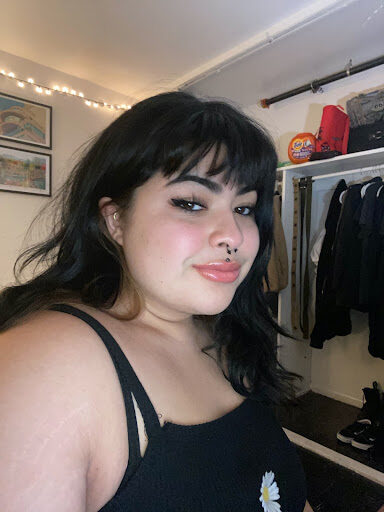

 MENU
MENU